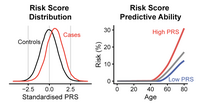Polygenic score

A polygenic score is like a recipe for telling how likely someone is to have a certain trait or condition. It's made up of lots of little pieces (like ingredients), which are actually tiny differences in a person's DNA code. Scientists look at all these differences in the DNA and use a special math formula to give a score to each person.
So let's say we want to know how tall someone might be based on their DNA. We might look at lots of different pieces of DNA that have been linked to height before. If someone has a lot of DNA differences that suggest tallness, they might get a high polygenic score for height. If they have more differences that suggest shortness, they might get a low score.
But it's not just about height – scientists can use polygenic scores to predict all sorts of things, like a person's risk of getting certain diseases or the likelihood they'll be good at math. Polygenic scores aren't always exactly right (just like a recipe doesn't always turn out perfect), but they can be really helpful in figuring out more about how our genes affect us.
So let's say we want to know how tall someone might be based on their DNA. We might look at lots of different pieces of DNA that have been linked to height before. If someone has a lot of DNA differences that suggest tallness, they might get a high polygenic score for height. If they have more differences that suggest shortness, they might get a low score.
But it's not just about height – scientists can use polygenic scores to predict all sorts of things, like a person's risk of getting certain diseases or the likelihood they'll be good at math. Polygenic scores aren't always exactly right (just like a recipe doesn't always turn out perfect), but they can be really helpful in figuring out more about how our genes affect us.
